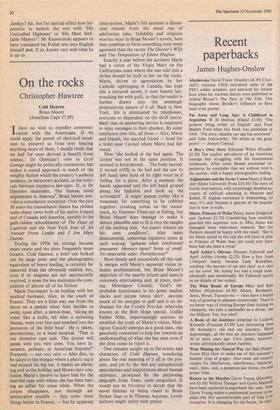Ingenious fable
Anthony Mockler
The Emperor: Downfall of an Autocrat Ryszard Kapuscinski (Quartet £7.95) This is an extraordinarily clever, rather I disgraceful book. But the criticisms of the sort I propose to make are in a sense a tribute to the imagination and ingenuity of an elegant virtuoso.
Mr Kapuscinski is — or rather was till 1981 — a foreign correspondent for the Polish News Agency. He first visited Ethiopia in April 1963. Haile Selassie — the Emperor of his title — was deposed by the present military rulers, the Dergue, over 20 years later, on 12 September 1974. 'Soon after the Emperor was deposed,' Mr Kapuscinski, back at the time in Addis Ababa, set out with an Ethiopian contact to find and interview 'the Emperor's people'. The resulting book purports to consist of interviews with — or rather the reminiscences of — 35 courtiers, identified only by their initials. Their fascinating stories cover the Emperor's habits and per- sonality, the moeurs of the court and the palace, the events leading up to the failed bodyguard coup of 1960 and the successful overthrow of the whole neo-feudal system in 1974; plus, movingly, Haile Selassie's last days as ruler. All this is viewed through the occasionally critical eyes of courtiers both major and minor, with `linking' passages written in by the author. It is an excep- tionally vivid and surprisingly sympathetic Portrait of the downfall of an autocrat who was never a despot. The author's Philosophical and political asides are as astute as they are admirable.
The whole book, however, seems to me to be an ingenious fantasy. I rather doubt Whether the interviews he reports took place in the way he describes them. 1 certainly do not believe that any of those he may have seen or sent someone to see spoke to him in the high-falutin' terms which he attributes to them. I consider the interviews to be an imaginative and admittedly brilliant exer- cise in historical reconstruction, rather on the lines of Robert Graves's I Claudius or Claudius the God.
If Haile Selassie's courtiers had talked to Mr Kapuscinski, and if they had been able to express themselves with the literary world-weariness of the ci-devants of the I'tench Revolution, then this is no doubt What they would or ought to have said. This nlaY well be in East European terms a higher truth. But it is not in Western terms a historian's or even a journalist's truth; it is a Playwright's truth. It has fooled reviewers in the USA (where it was published by Har- court Brace Jovanovitch earlier this year) and is now (see Tariq Al's recent rapturous review in the New Statesman) fooling the more gullible in this country too. But to anyone who knows anything of Ethiopia and the Ethiopians the whole basis on which the book is conceived is in- conceivable. The ex-courtiers would not have talked; they would not have talked at that time; they would not have talked to a ferengi, even accompanied; and they would not have talked in that way.
I suspect that Mr Kapuscinski has created a work of art out of a hotchpotch of second-hand gossip, genuine news stories, and popular myths (eg of the Emperor ordering his famous lions to be killed for not defending the palace) flavoured with the results of a handful of furtive inter-
views, seasoned with his own views, and rehashed in his own fastidious style. He has covered himself most ingeniously; after all, he can always argue that he is reporting other men's opinions only, not facts.
The Emperor is — few would deny it — enjoyable reading, but as tragedy or satire, not as history. What for instance is one to make of all those variants of Haile Selassie's title strewn throughout the pages? 'His Most Exalted Majesty,' Distinguished Monarch', 'His Sublime Highness', 'His Venerable Majesty' — to take only a single page's examples. From what Ethiopian phrase or phrases are they translated? From the simple and habitual Janhoy? Ah, but for satrical effect how im- pressive to bedeck the text with 'His Unrivalled Highness' or 'His Most Inef- fable Majesty'! Mr Kapuscinski appears to have translated his Polish text into English himself and, if so, knows very well what he is up to.















































 Previous page
Previous page